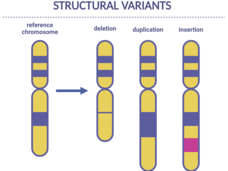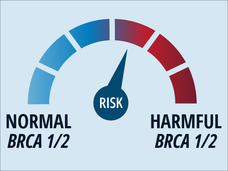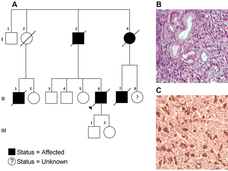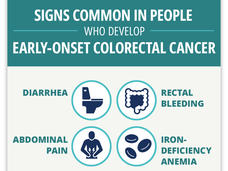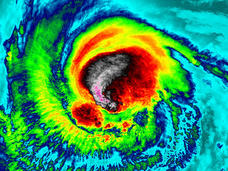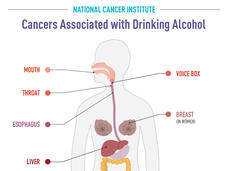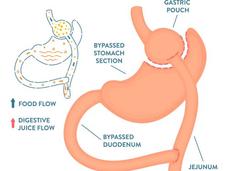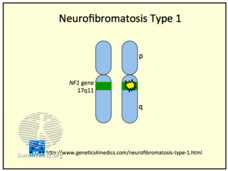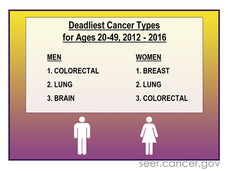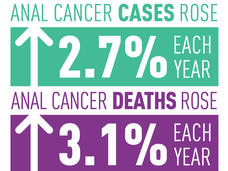Cancer Risk - Cancer Currents Blog
News about research on factors that affect cancer risk, including inherited genetic mutations, smoking/tobacco use, obesity, and infectious agents like HPV.
-
Scientists Find Genetic Changes Linked to Cancer in Children
Certain inherited genetic changes are likely involved in the development of some cancers in children, a new study shows. The changes, called structural variants, were linked with a small percentage of children with neuroblastoma, Ewing sarcoma, and osteosarcoma.
-
Understanding the Risk of Second Cancers After CAR T-Cell Therapy
In late 2023, FDA announced it was investigating instances of second cancers following treatment with CAR T-cell therapies. In this Q&A, NCI’s Dr. Stephanie Goff explains what’s known about the issue, stressing that second cancers “of any kind are rare.”
-
Studies Assess Impact of Cancer Risk-Reduction Measures for People with BRCA Changes
For women with inherited changes in the BRCA1 or BRCA2 genes, regular MRI scans and undergoing a surgery called a salpingo-oophorectomy appear to lower their chances of dying from breast and ovarian cancer, according to results from two studies.
-
For People with Inherited Risk of Stomach Cancer, Gastrectomy Has Lasting Consequences
In a recent study, more than 90% of people who’d had their stomach surgically removed to prevent cancer experienced a least one chronic complication 2 years out from their surgery. For some, the complications are life altering.
-
Few People with Cancer Undergo Testing for Inherited Gene Mutations
Despite recommendations, a new analysis shows few people with cancer undergo germline testing to learn if their cancer may have been caused by gene changes inherited from a parent. Germline testing can help doctors determine the best treatments for a patient and help identify people whose family members may be at higher risk of cancer.
-
Study Identifies Potential Warning Signs of Colorectal Cancer in Younger Adults
Researchers have identified four warning signs that they believe may help identify colorectal cancer early in younger adults. The signs or symptoms are abdominal pain, rectal bleeding, diarrhea, and iron deficiency anemia.
-
Cancer and Climate Change: The Health Threats of Unnatural Disasters
The consequences of climate change have already affected cancer care in the United States, particularly in areas hit by hurricanes and wildfires. Researchers are studying how to mitigate that impact and better understand the effect of climate change on the risk of developing cancer.
-
Study Probes Awareness of Alcohol’s Link to Cancer
A study confirmed that most US adults aren’t aware of the link between alcohol consumption and cancer. Even among those surveyed who were aware, some believed risk varies by the type of alcohol.
-
Bariatric Surgery May Reduce the Risk of Some Common Cancers
A new study suggests that people with obesity who had bariatric surgery had a much lower risk of five common cancers that aren’t related to hormone levels, including lung, colorectal, and esophageal cancer.
-
Why Have Thyroid Cancer Diagnoses Spiked for US Women?
Women are far more likely than men to be diagnosed with small thyroid cancers that probably would have never caused problems during their lifetime, a new study finds. The results may help explain why thyroid cancer seems to be more common in women.
-
Alcohol Tied to 750,000 Cancer Cases Worldwide in 2020
Nearly 750,000 cases of cancer diagnosed worldwide in 2020, or 4%, can be attributed to alcohol consumption, according to a new study. While heavy drinking accounted for most cases, light and moderate drinking accounted for a modest amount.
-
Pattern of DNA Damage Links Colorectal Cancer and Diet High in Red Meat
Researchers have discovered a consistent pattern of DNA damage in colorectal tumors that may explain how a diet high in red and processed meat can help cause colorectal cancer.
-
Could a Diabetes Diagnosis Help Detect Pancreatic Cancer Early?
Numerous studies have pointed to a link between new-onset diabetes and pancreatic cancer. Now, several large NCI-supported studies are testing ways to pick out those people whose diabetes might be a sign of early pancreatic cancer, when treatments may be more effective.
-
NF1 Associated with More Cancer Types Than Previously Known
The study also found that people with neurofibromatosis type 1 (NF1) developed some cancers at an earlier age and were more likely to die from several cancer types, which make preventive measures and early diagnosis important for people with NF1.
-
For Cancer Screening, COVID-19 Pandemic Creates Obstacles, Opportunities
After a steep drop in screening for common cancers early in the COVID-19 pandemic, researchers are now exploring ways to improve cancer screening during the current crisis and beyond.
-
Why Is Colorectal Cancer Rising Rapidly among Young Adults?
Diagnoses of colorectal cancer continue to increase in younger adults. In September 2020, more than 400 leading scientists and patient advocates participated in an NCI/NIEHS-sponsored symposium to identify research priorities that address important questions about this concerning trend.
-
Anal Cancer Incidence and Deaths Are Rising in the United States
The number of cases and deaths from anal cancer have been on the rise in the United States since 2001, according to a new study. The increases have been especially rapid in two segments of the population.
-
MGUS to Myeloma: Study Suggests Risk of Progression Can Change
A person’s risk of progressing from a benign condition called monoclonal gammopathy of undetermined significance (MGUS) to the blood cancer multiple myeloma can change over time, according to a new study.
-
Could a Vaccine Prevent Colorectal Cancer in People with Lynch Syndrome?
Findings from an NCI-funded study suggest a new vaccine approach may have the potential to prevent colorectal cancer in people with Lynch syndrome, an inherited condition that increases an individual's risk for developing certain types of cancer.
-
Studying “Total Diet” and Its Impact on Health, Including Cancer Risk
Researchers are shifting how they assess diet and cancer risk, looking beyond the impact of individual foods or nutrients on health, and taking a more holistic approach, considering dietary patterns across the lifespan.
